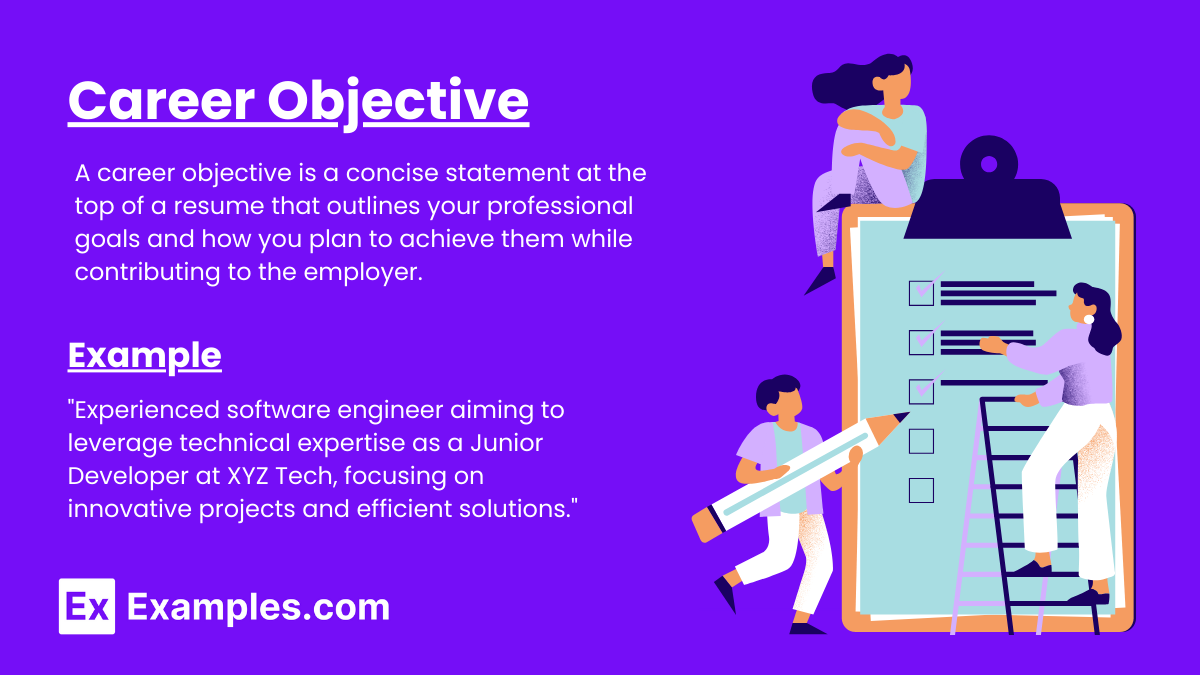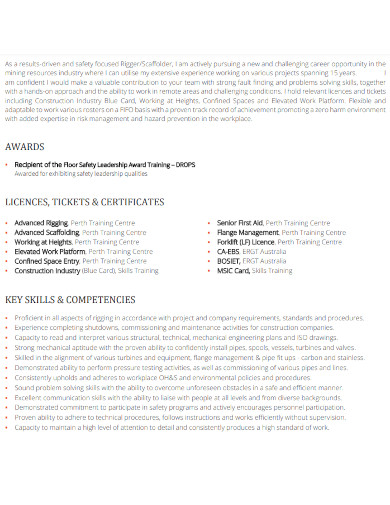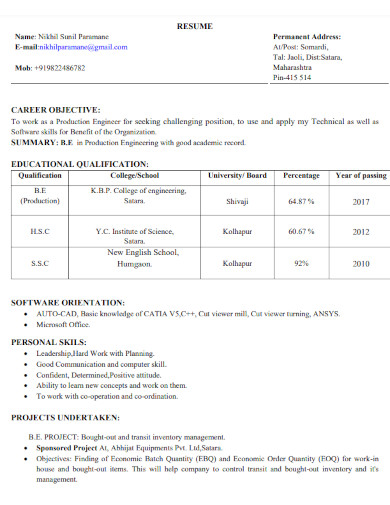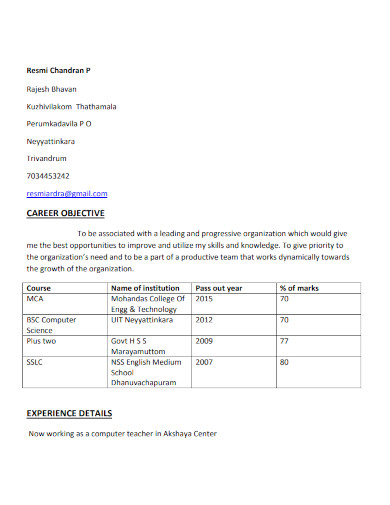35+ Career Objective Examples
When crafting your resume, the career objective serves as a crucial opening statement that outlines your professional goals and aspirations. This concise and strategic declaration helps to capture the attention of employers by highlighting your commitment and enthusiasm for the role you are applying for. It sets the tone for the rest of your resume, emphasizing your qualifications and the unique contributions you aim to bring to the position. In this article, we’ll guide you through writing an effective career objective that resonates with hiring managers and positions you as the ideal candidate for the job.
What Is a Career Objective?
A career objective is a written statement of two to three sentences that will concisely relay one’s career directions and goals with the position they have applied for. The information this will relay can be used by the hiring manager or HR to endorse the applicant to the next step of the application process.
Career Objective Examples for Resume
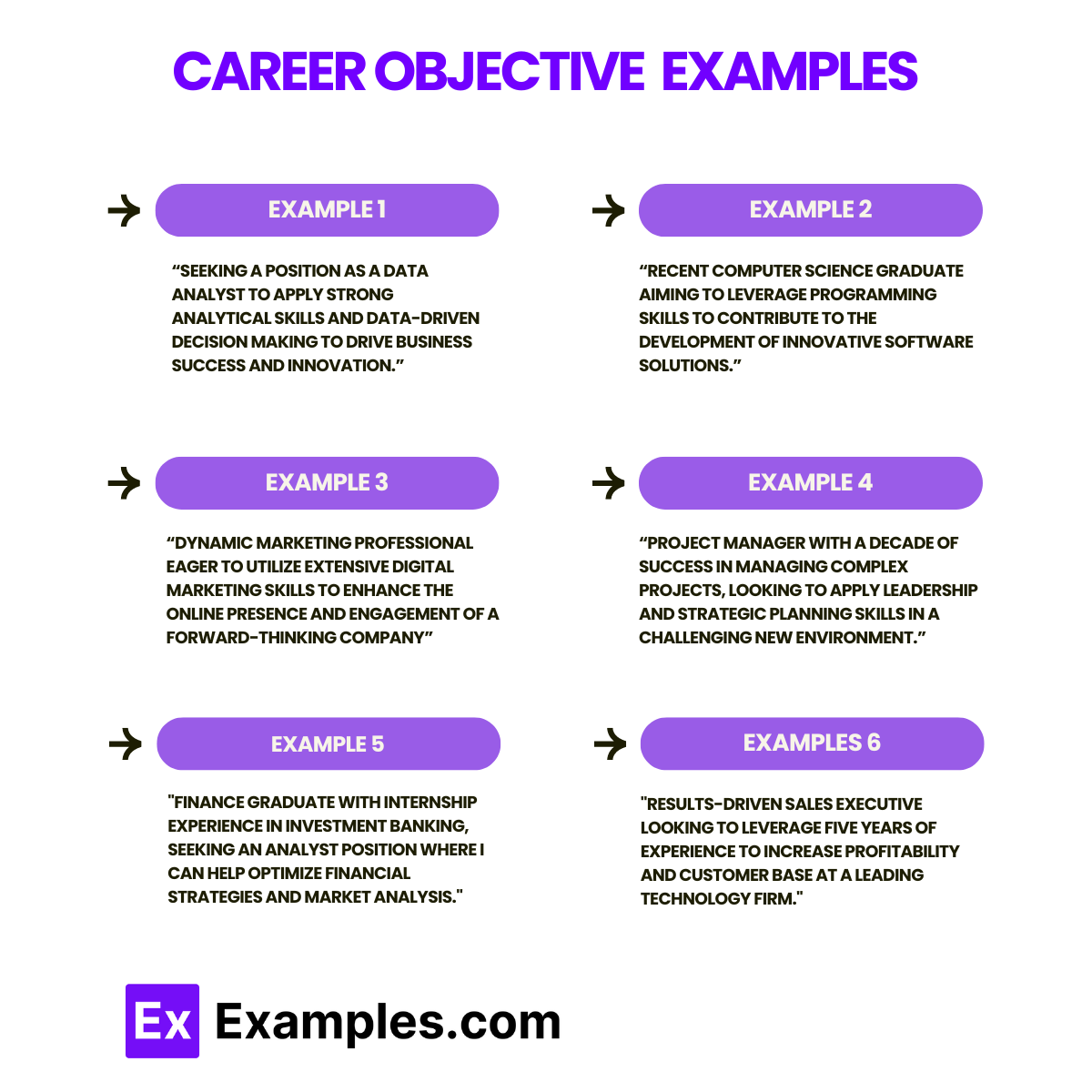
- Entry-Level Applicant: “Recent graduate with a B.A. in English Literature seeking to leverage acquired academic knowledge and analytical skills to effectively fill the editorial assistant position at [Company Name]. Eager to learn and contribute towards creating engaging content.”
- Career Changer: “Experienced project manager transitioning to the digital marketing field, with proven record of project completion on time and under budget. Aiming to apply my ability to effectively manage cross-functional teams and high-stake projects at [Company Name].”
- Professional Seeking Advancement: “Driven financial analyst with over 5 years in the banking industry seeking to leverage extensive background in data analysis and financial modeling to advance into a managerial role at [Company Name].”
- Customer Service Professional: “Customer service specialist with over 4 years of experience in the telecommunications industry, aiming to use my proven customer support skills to effectively fulfill the requirements of the Client Support Specialist position at [Company Name].”
- Healthcare Professional: “Registered nurse with 3+ years of experience in pediatric care, looking to leverage my patient care skills and friendly, professional demeanor to provide the highest level of care at [Hospital Name].”
- IT Professional: “Dedicated IT specialist with a strong foundation in programming, software development, and database management, seeking to bring my technical expertise to a challenging new role at [Company Name].”
Career Objective Examples for Students
- High School Student: “Motivated high-school junior striving for a summer internship position where I can expand my skills in digital media and web design while contributing positively to the company.”
- Undergraduate Student: “Economics major with strong academic record looking to start my career in financial consulting with a focus on market research and data analysis.”
- Graduate Student: “Master’s candidate in Environmental Science applying for a research assistant position to utilize my background in data gathering and performance analysis in environmental projects.”
- Student Leadership Role: “Aspiring leader pursuing a position in student government, aiming to use my leadership skills and policy knowledge to enhance student engagement and campus initiatives.”
- Student Intern: “Engineering student seeking an internship that will allow me to utilize my problem-solving skills and hands-on experience in mechanical engineering.”
- Part-Time Job Seeker: “University student seeking a part-time sales associate position, offering flexibility, a strong customer focus, and a dynamic working environment to gain retail experience.”
Career Objective Examples for Medical Students
- Medical Intern: “Aspiring medical professional seeking an internship in a clinical setting, aiming to apply my comprehensive knowledge of medicine and patient care learned through rigorous academic training.”
- Research Focus: “Medical student looking to specialize in microbiology research, eager to contribute to groundbreaking studies while gaining practical experience in a lab setting.”
- Residency Applicant: “Recently graduated MD seeking a residency in internal medicine, where I can develop my clinical skills further while contributing to patient care with empathy and efficiency.”
- Medical Volunteer: “Dedicated medical student seeking volunteer opportunities to assist in providing medical services in underserved communities and gain firsthand experience.”
- Specialization Intent: “Future pediatrician in training, eager to bring my dedication and pediatric care skills to [Hospital’s Name] residency program.”
- Healthcare Administration: “Medical student with a strong interest in healthcare policy seeking an administrative role that will allow me to utilize my academic background and organizational skills to improve hospital efficiency.”
Objective Examples for Multiple Jobs
- Flexible Professional: “Dynamic professional with 5+ years in the retail and technology sectors seeking to leverage extensive sales and tech expertise in a customer service management role at [Company Name].”
- Versatile Worker: “Skilled in both graphic design and social media management, looking for opportunities to blend creative and digital skills in a thriving, forward-thinking company.”
- Adaptable Manager: “Experienced manager adept at overseeing projects in both construction and IT sectors, aiming to apply my strong leadership skills and multifaceted experience to a new challenge at [Company Name].”
- Diverse Skill Set: “Professional with backgrounds in both education and healthcare, seeking to integrate my counseling and teaching skills in a health educator role.”
- Multidisciplinary Developer: “Software developer with experience in financial applications and mobile game development seeking to contribute my versatile programming skills to a new project team at [Tech Company].”
- Cross-Functional Expertise: “Marketing professional with a decade of experience in both digital and traditional advertising, interested in a position that embraces innovative strategies to increase brand visibility.”
Career Objective Examples for Experienced
- Senior Analyst: “Senior financial analyst with 10 years of experience managing multi-million dollar budgets looking to bring my strategic financial planning skills to [Company or Industry].”
- Experienced Project Manager: “Seasoned project manager seeking to utilize my 12 years of project delivery experience to lead complex projects at [Company Name], ensuring high-quality and timely deliverables.”
- Marketing Director: “Marketing director with 15 years in the industry seeking a challenging role at a leading agency where I can use my expertise in brand development and digital marketing to drive ROI and brand loyalty.”
- Chief Technology Officer: “CTo with over 20 years of experience in software development and team leadership, looking to leverage my skills in a burgeoning tech firm that values innovation and problem-solving.”
- Human Resources Executive: “HR executive with a decade of experience in recruitment and workforce management, eager to apply my expertise in strategic planning and employee engagement at a major corporation.”
- Experienced Educator: “Veteran teacher with over 25 years of experience in a variety of educational settings, seeking an administrative role where I can contribute to innovative learning strategies and curriculum development.”
Career Objective Examples for Teachers
- Early Childhood Education: “Passionate early childhood educator seeking a teaching position at [School Name], where I can apply my creativity and dedication to foster a nurturing learning environment.”
- Special Education Teacher: “Dedicated special education teacher looking to utilize my specialized skills in behavioral strategies and individualized support to make a difference in the lives of exceptional learners.”
- High School Teacher: “Experienced high school biology teacher eager to bring my expertise in science education and my commitment to helping students succeed to a new academic environment.”
- Elementary School Teacher: “Enthusiastic elementary school teacher with a proven track record in improving student literacy and math scores, seeking to contribute to the academic success at [School Name].”
- Substitute Teacher: “Flexible and dependable substitute teacher with experience in multiple grades and subjects, ready to ensure continuity in education whenever needed.”
- Physical Education Teacher: “Dynamic physical education teacher with 5 years of experience in developing and implementing fitness programs that cater to the needs of all students, aiming to inspire a lifelong commitment to health and wellness.”
Purpose of Career Objective on Resume
The main purposes of including a career ON a resume are:
- Direction: It shows the employer immediately what job or career you are interested in and how you align with their needs.
- Relevance: It allows you to tailor your resume to the specific job and company, demonstrating that you have a clear understanding of your role in the context of the broader organization.
- Personalization: It differentiates your resume from others by adding a personal touch, showing a bit of your personality and career aspirations.
- First Impression: It acts as a hook to engage the hiring manager’s interest in reading more about your qualifications and experiences.
Types of Career Objectives
General Career Objectives
General career objectives focus on broad professional goals and are suitable for resumes when applying to various types of positions. These are often used when you have a diverse set of skills or are open to working in various industries.
Specific Career Objectives
Specific career objectives are tailored to a particular job or industry. They clearly outline the position you are seeking and how you plan to contribute to the company. These are particularly useful when applying for specialized roles or industries where targeted skills are crucial.
Entry-Level Career Objectives
For those just starting their career or transitioning to a new field, entry-level career objectives emphasize educational backgrounds, transferable skills, and a strong eagerness to learn and grow within a company.
Executive Career Objectives
Executive career objectives are for individuals aiming for senior management positions. These objectives highlight leadership experience, achievements, and the ability to drive organizational success at a high level.
Career Change Objectives
Career change objectives are used when shifting industries or roles. They focus on transferable skills and a clear rationale for the career shift, emphasizing how past experiences are relevant to the new field.
Internship Career Objectives
Internship career objectives are designed for students or recent graduates seeking internships. They usually focus on gaining specific industry experience and skills, and often mention the contribution to the company while learning.
What Do I Include in a Career Objective?
- Career goals: Briefly describe your professional aspirations. This can be specific or more general, depending on how closely your goals align with the job.
- Relevant skills and competencies: Highlight skills that are particularly relevant to the job. This could include both technical and soft skills.
- Experience and achievements: Mention any prior experience that directly relates to the job, including notable achievements that can demonstrate your capability.
- How you can contribute: Clearly state how you can benefit the company or the specific team you wish to join.
- Personal qualities: Optionally, include a few words about your personal attributes or work ethic that make you a suitable candidate for the position.
Tailoring Your Objective
It’s important to tailor your career objective to each job you apply for. This means modifying the statement to better match the job description and the company’s goals, which can significantly increase your chances of catching the attention of hiring managers.
How to Create Your Career Objectives For Your Resume
Well-written career objectives can relay specific information and notions to the reader or hiring manager, which can increase your chances of being endorsed into the next step of the application process. If you need a reference or a career objectives example, you may use any of the templates and guides on the links above when you are creating your career objectives to make the perfect resume.
Step 1: Outline the Objectives
Begin by creating an outline of the career objectives you will write on your resume. Note that the objectives should only be composed of two to three sentences.
Step 2: Include Relevant Information Tailored to Your Career
Be sure to include relevant information relevant to the career you are pursuing and creating the resume for. This will ensure that the person obtaining the resume (hiring manager or HR) knows that you have sufficient information and knowledge about the position you are applying for. Doing this will increase your chances of being endorsed as the next step in the hiring process.
Step 3: Indicate Your Strengths
Everyone is unique, therefore you should try your best to make your resume noticeable and exciting to stand out from the rest. Be sure to indicate what makes you unique and why the hiring manager or HR should endorse you to the next step in the hiring and application process.
Step 4: Reread and Edit the Objectives You Have Provided
After you have finished writing your career objectives, be sure to reread its contents and search for any mistakes in the text you have written. You can also opt to have a professional read your career objectives and provide you with their feedback. Edit your objectives accordingly.
Choosing Elements for Your Career Objective
Analyzing the Job Description
Start by carefully reading the job description. Pay attention to the skills, experiences, and qualifications that are emphasized as most important. This analysis will guide you in selecting which elements to highlight in your career objective.
Aligning with Company Goals
Research the company’s mission, culture, and current goals. This insight helps you align your career objective with what the company values and is aiming to achieve. It can make your objective more relevant and appealing to the hiring manager.
Reflecting Your Strengths and Career Goals
Choose elements that reflect your strengths and professional aspirations. This ensures that your career objective is not just tailored to the job, but also true to your own career path and goals.
- For recent graduates: Focus on education, any relevant coursework or projects, and applicable skills or internships.
- For career changers: Emphasize transferable skills and explain how your previous experiences prepare you for this new role.
- For experienced professionals: Highlight your proven track record, specific achievements, and advanced skills that showcase your expertise.
Being Concise and Specific
Keep your career objective concise and to the point. Aim for no more than two to three sentences. Specificity helps in making a strong, memorable impression. Instead of vague statements, use concrete examples of your skills and achievements.
How Good is My Career Objective?
Relevance to the Job
Check if your career objective specifically addresses the skills and qualifications mentioned in the job description. It should clearly illustrate how your background aligns with the role you are applying for.
Clarity and Conciseness
Your career objective should be straightforward and concise. It should clearly communicate your goals and qualifications without unnecessary details or overly complex language.
Impactfulness
Evaluate whether your objective makes a strong impression. Does it start with a powerful statement? Does it highlight your unique qualifications and how you can contribute to the company?
Customization
Ensure that your career objective is not generic. A tailored objective shows that you have put thought into how you specifically fit the role and the company.
Grammar and Tone
Finally, check for any grammatical errors or awkward phrasing. The tone should be professional and confident.
Why Career Objective Matters
Clarity and Direction
A well-defined career objective helps you to have a clear understanding of your career path. It serves as a roadmap, guiding your professional journey and keeping you focused on your goals.
Focus for Job Applications
Including a career objective in your resume or cover letter shows potential employers that you have a clear sense of direction and know what you want to achieve in your career. This can make you a more attractive candidate.
Self-Motivation
Having a career objective can enhance your motivation. It gives you something to strive for and can inspire you to work harder and smarter to achieve your career goals.
Enhanced Decision-Making
A clear career objective helps in making informed decisions regarding job opportunities, professional development, and career moves. It ensures that your choices align with your long-term career aspirations.
Performance Measurement
A career objective provides a benchmark against which you can measure your progress. It allows you to assess whether you are on the right track and making the necessary strides toward achieving your career goals.
Professional Branding
A well-articulated career objective can contribute to your professional brand. It communicates your professional identity, ambitions, and values to potential employers and professional contacts.
Career Objective Writing Tips
Keep It Concise and Specific
A career objective should be brief, ideally one to two sentences long. It should clearly state your professional goals and what you aim to bring to the position you are applying for. Focus on specific skills or experiences that align with the job.
Tailor It to the Job
Customize your career objective for each job application. This shows employers that you have a clear understanding of what the job entails and that your goals align with the company’s needs.
Highlight Your Skills
Use the career objective to highlight your most relevant skills and experiences. This could include specific technical skills, years of experience in a similar role, or key accomplishments.
Be Honest and Realistic
Your career objective should reflect your genuine professional aspirations. It should also be achievable within the company you are applying to, suggesting that your career goals are a good fit with the organizational path.
Use Keywords from the Job Description
Incorporate keywords from the job description into your career objective. This not only shows that you are a good match for the role but also helps your resume get past automated applicant tracking systems.
Show Enthusiasm
Express your enthusiasm for the position and the company. This can make your objective stand out and show that you are motivated and excited about the opportunity.
Avoid Generic Statements
Stay away from vague or overly broad statements that could apply to any applicant. Personalize your objective to reflect your unique traits and career goals.
1. Professional Resume Example
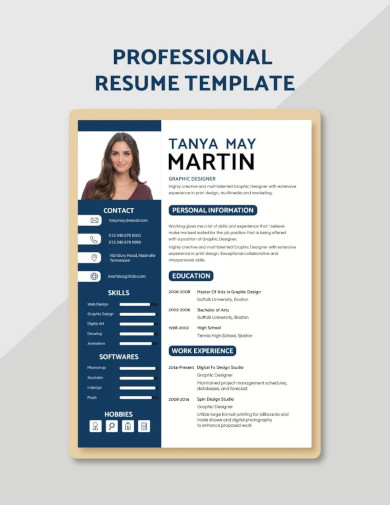
2. Engineer Resume Example
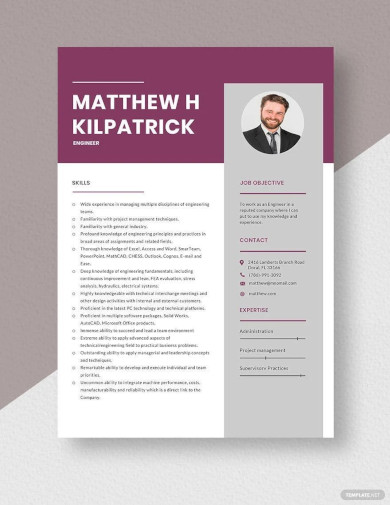
3. Student Resume Example
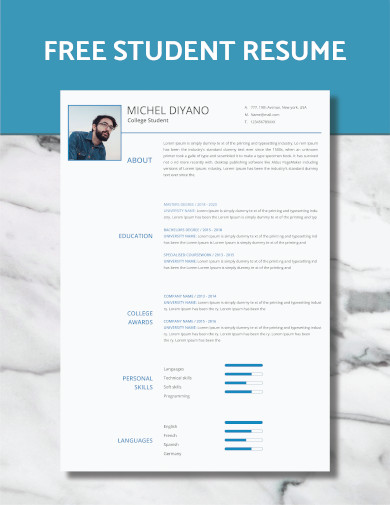
4. Fresher Resume Example
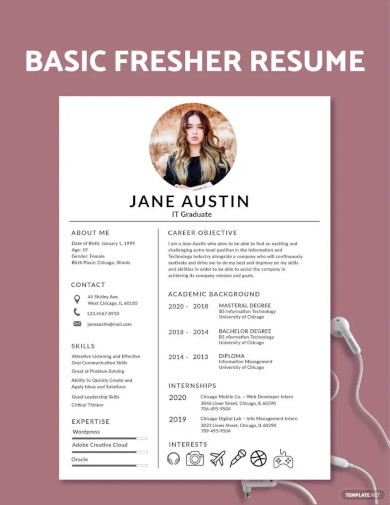
5. Career Objective Resume Examples
6. Career Objective Template
7. Experience Career Objective Example
9. Career Objective Statement Example
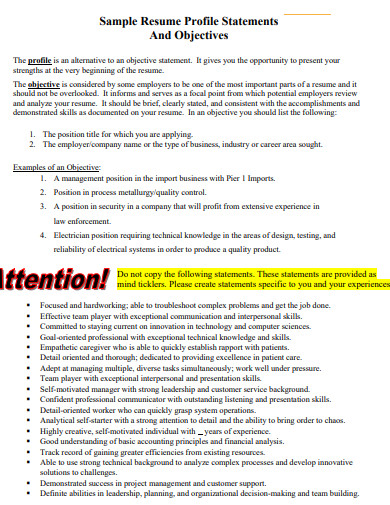
astate.edu
10. Entry Level Career Objective Example
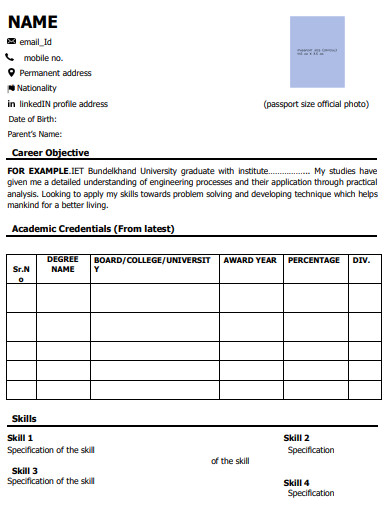
bujhansi.ac.in
Why is a career objective important?
A career objective provides clarity, showcases your motivation, and helps employers understand your career direction, making your resume stand out in competitive job markets.
How to write an effective career objective?
Write an effective career objective by being concise, specific, aligning with the job role, and highlighting your key skills and achievements relevant to the position.
Should a career objective be included in a resume?
Including a career objective in your resume is recommended if it adds value, aligns with the job role, and emphasizes your career goals and key skills.
How long should a career objective be?
A career objective should be one to two sentences long, precise, and clearly state your professional goals and what you aim to achieve in the role.
What are some examples of career objectives?
Examples: “Seeking a marketing position to utilize my SEO skills,” or “Aspiring software developer aiming to leverage programming expertise at a leading tech company.”
How often should you update your career objective?
Update your career objective whenever you change your career goals, apply for different job roles, or acquire new skills that enhance your professional profile.
Can a career objective be customized for different jobs?
Yes, tailor your career objective for each job application, aligning your skills and goals with the specific requirements and expectations of the job role.
What common mistakes should be avoided in a career objective?
Avoid vague language, being overly generic, and including irrelevant information. Ensure your career objective is specific, relevant, and aligns with the job role.
How does a career objective differ from a resume summary?
A career objective focuses on your career goals and what you aim to achieve, while a resume summary highlights your key skills, experiences, and achievements.



